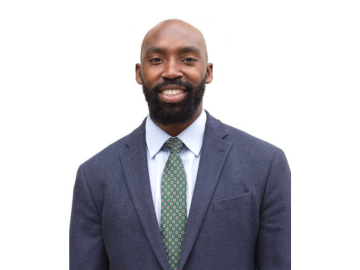There are a trillion-and-a-half reasons right now for us to reimagine procurement for Black-owned middle market companies:
- We have an enormous opportunity to close our country’s wealth gaps, particularly through the inclusion of Black-owned companies in manufacturing supply chains underpinning three recent acts: the Infrastructure Investment and Jobs Act (IIJA, 2021), the CHIPS and Science Act (CHIPs Act, 2022), and the Inflation Reduction Act (IRA, 2022). Altogether, these measures authorized $1.5 trillion to recast our country’s industrial landscape through infrastructure, tech, and clean energy.
- Black-owned businesses are largely underrepresented in 13 key supply chains identified by a 2024 Harvard report titled “Racial Equity in America’s New Industrial Transformation” from the Initiative for a Competitive Inner City ICIC. Black-owned businesses comprise 0.5% of all businesses in these 13 supply chains, while Black people make up 13.5% of the U.S. population – that’s 2,600% more total share of the population than the share of businesses in the supply chain.
- Despite this significant underrepresentation, Black-owned manufacturers in those 13 supply chains are typically bigger ($897K median revenue, 10 employees) than their white-owned peers ($499K median revenue, eight employees). This validates that Black-owned businesses have big economic potential and can make serious, material contributions to a U.S. industrial transformation.
For more information, I encourage you to dig deeper into the ICIC report. Download it here and share it with your network.
Now, let’s look deeper into the report’s implications for Black women entrepreneurs through the eyes of Shawntera Hardy, a former City of Saint Paul city planner and State of Minnesota Commissioner at the Department of Employment and Economic Development, who founded and built four companies, including Certified Access in St. Paul.

Co-founders of Certified Access: (Right) Shawntera Hardy, chief strategy officer; (middle) Char Dobbs, CEO; and (left) Camille Thomas, chief culture officer. Photo by Desiree Wells.
Shawntera has a bird’s-eye view of the intersection where inclusive economies, technology, and public policy meet. I asked her how corporations can reimagine procurement at this moment to make it more inclusive of Black women, in particular. She cited critical fixes, including making it easier to access procurement portals and guides to navigating the complex certification process. Additionally, underpinning those hurdles for Black women, she said, is the systemic obstacle of establishing relationships with corporate procurement professionals to position themselves as suppliers of choice.
A handful of organizations and companies today are working to bridge the procurement/supplier relationship gap, including the National Minority Supplier Diversity Council (NMSDC), Women’s Business Enterprise National Council (WBENC), Women Presidents Organization (WPO), and B2T (Bridge 2 Technologies, a Silicon Valley company whose technology platform tries to close the gap between corporate America and the talent pool of people of color and minority-owned businesses).
Yet more is needed.
First, Shawntera said, Black woman entrepreneurs can position themselves when they know someone who can tell them specifically what the corporation is seeking to buy. That basic knowledge is not necessarily readily available on corporate websites and procurement portals, which are in abundance. So, corporations need to build an environment where they set up suppliers for success with clear step-by-step guidance about the process.
To that point, Dr. James Hill, in the Department of Operations and Business Analytics and a professor of Operations Management at Ohio State University, has this to say about the strategic planning process:
“I sense that Black-owned businesses do not have the access needed for involvement in the buyers’ planning process. They do not have meaningful inclusion in the innovation process where strategic decisions are made, such as product development and launch, product and process innovation, and R&D. This lack of involvement in the strategic planning and being unable to escape the commodity position results in a lack of upward mobility for minority suppliers.”
Building on a call to action to invite Black women into corporate buyers’ strategic planning processes, Shawntera said it is urgent to increase investments in capacity-building.
Once a supplier gets in the door for a small contract, Shawntera asked, where is the organization’s commitment to ensure that Black business has the capacity to get to the next contract, and the one after that? “Do they see the opportunity for that business to go from a small supplier to prime contractor?” she asked.
Without that buy-in to capacity-building, it’s an uncertain path.
On top of that, most business-development resources gravitate to startups, Shawntera said. Which leaves middle market or second-stage companies on the sidelines with limited access to the knowledge needed to sale. The reality of this is clear as the data shows this barrier is at the top of the list when we analyze why businesses owned by Black women struggle to break that quarter- to half-million company size.
Another fact to consider in reinventing the procurement process: Black women business leaders tend to stay “solopreneurs” – running their businesses independently as the sole owners and employees for longer than other segments.
Not taken into consideration in the current procurement process, Shawntera said, is that a Black woman solopreneur often lacks the necessary staff or team to navigate the procurement process, along with the most-precious commodity of all: time. Time to be able to work on their business and work in their business.
She cited an example from the beauty industry. “I have been in the room on several occasions and heard stories from several prominent Black women who successfully were able to get on [a major retailer’s] shelves and they candidly stated those first couple of orders almost broke them. They didn’t have the capacity, the technology capabilities, and/or logistics acumen to handle that big load.”
Getting in as a supplier to a major retailer is the easy part, she warned. “The hard part is fulfilling the orders in alignment with how procurement has been built, or not built, from that backdrop that I mentioned” – the essential commitment of the corporation to building a supplier’s capacity.

Shawntera’s own company, Certified Access, helps entrepreneurs with procurement and back-office support. I asked her about the “8(a) cliff.” 8(a) refers to the Small Business Administration 8(a) Business Development program, a nine-year federal contracting and training program for experienced small business owners who are socially and economically disadvantaged.
Specifically, I asked her how we can help companies bridge from the end of their 8(a) contracting privileges to the next growth horizon.
One way, she said, is by working with 8(a) companies, well in advance of the cliff to prepare their business to compete in the open market. This can include investing in strategy support to enhance their business model to diversify customers, investing in technology, including cybersecurity, and developing a robust marketing strategy to reposition the company in the marketplace. “The investments will not only position that company for the next big opportunity, but also allow them to be a competitive supplier for more than the current project. That’s buying into to the capacity of a company.”
As previously mentioned, outside of financial and technical assistance, the most critical resource Black women business owners need to make their companies successful, according to Shawntera, is time.
“Folks in the middle market that have strong infrastructure support have the bandwidth to invest in research and development, explore new technologies such as AI, and educate themselves on industry involving trends. But if you think about businesses that surveyed in the “2024 Insights and Perspectives from Black Leaders in the Middle Market”, they may not have any margin to do any of this. Time to tinker and innovate, or time to be ahead of the industry to really position oneself comes at a premium.
“I am based in Minnesota, and we are a state of hockey. We like to say you want to be where the hockey puck is going to be, but that takes timing, which takes strategy, and that takes having the right people on the ice in the right positions inside your organization. It also means having the best banking relationship, legal teams, and the accounting teams outside your organization.
Yet getting where the puck’s going to be for Black women CEOs – especially those who get to the middle market level who are often wearing multiple hats can often be out of reach.
That circles back to the ICIC, which includes several specific recommendations to support the increased participation of Black-owned businesses in the $1.5-trillion industrial transformation. These include encouraging financial institutions, to promote supply chain finance, adhere to anti-discrimination laws, advocate for greater diversity among investors, and expand technical assistance networks.
The ICIC urges reforms in procurement practices that help increase access and opportunities for minority-owned companies by unbundling large contracts and offering financial incentives for inclusive procurement policies.
How do we execute on those reforms? The ICIC thinks a more racially and ethnically inclusive industrial future is possible for Black owners of middle market companies, but it will take “a concerted effort” from all stakeholders to get corporations, government agencies, OEMs, lenders, investors, technical assistance providers, and foundations to implement policies that help move things in the right direction.

Moses Harris is a Senior Vice President and the Black/African American Segment leader for Wells Fargo Commercial Banking, where he has worked 14 years. He earned an M.B.A. from California State University, Fresno. Harris is based in Los Angeles, where he lives in the Studio City. He volunteers as an entrepreneurship and financial literacy instructor for the nonprofit 100 Black Men of Los Angeles. He serves on the boards of AmPac Business Capital, a nonprofit lender to small businesses, and the NASDAQ Entrepreneurial Center. He can be reached at moses.harris@wellsfargo.com.
The views expressed present the opinions of the author on prospective trends and related matters in middle market banking trends as of this date. The research and citations contained herein are the work product of the author. The view expressed herein do not necessarily reflect the views of Wells Fargo & Co., its affiliates and subsidiaries.